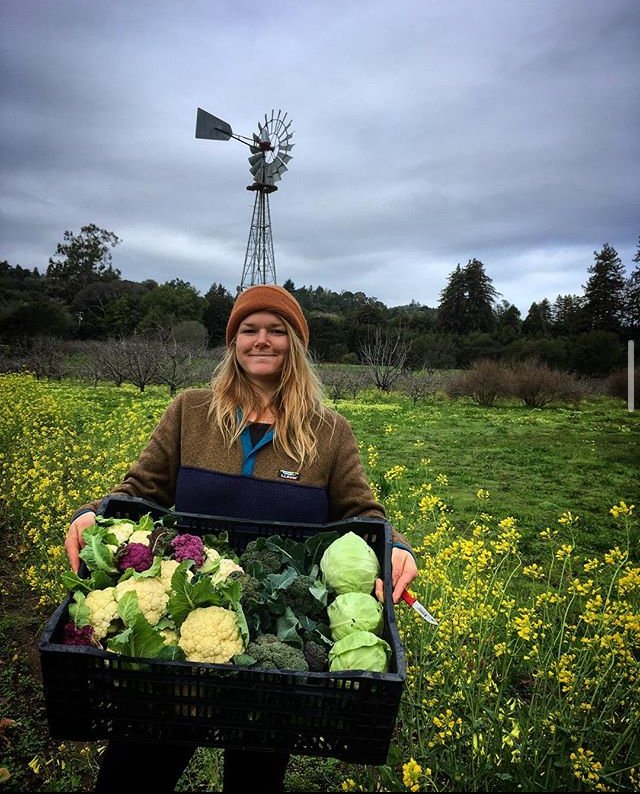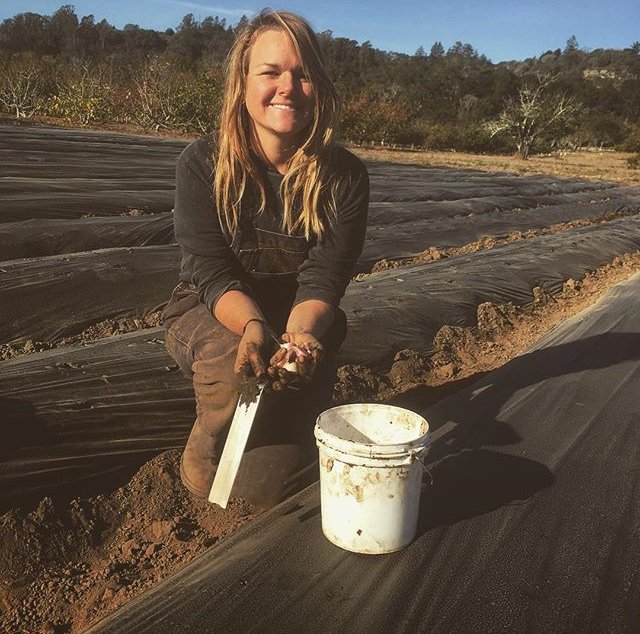EMILY PARSONS
Emily has been farming on farms not her own for 14 years. She is currently taking a farming gap year with her partner in Vashon, Washington.
WHAT ARE YOU CURRENTLY DOING? (WHERE HAVE YOU BEEN WORKING, ETC)
We just left a farm in California and moved to Vashon, Washington, which is between Seattle and Tacoma.
I’m actually taking a break from farming. My partner and I wanted to spend this year as our farming gap year where we see what it feels like to not be farming for our main source of income. Where does all of our growing energy go? Right now we are just helping people with their gardens, doing a food bank garden, nannying for money, and doing odd jobs. I’m taking a year off because I just left the farm I had been at two months ago. In the future, once we feel like we’ve kind of taken some space from the grind of farming, our long term goal is to start a food bank farm call “Free for All Farm”. It’ll be a nonprofit. It’s not in the works yet. We are chilling right now.
HOW LONG HAVE YOU BEEN FARMING?
I started farming in high school, so like 14 years ago.
WHAT INITIALLY BROUGHT YOU TO THE FIELDS?
Farming was just a summer job that I always had. When I was an undergrad, I worked on the school's organic veggie farm and it was run by women and it was awesome. It was an educational place and a super beautiful haven and magical space. That was a really great crew and situation. They had a lot of freedom within the university and everyone who worked there had a really fun time. Now I’m chasing the dragon of finding the perfect crew.
We call it (the perfect crew) WOM: the “well oiled machine”.
WHY HAVE YOU CHOSEN TO FARM FOR SOMEONE ELSE (NOW OR IN THE PAST?)
Just because I don’t want to take on that financial responsibility that would keep me up all night. I’m in it for the challenge, beauty, and physicality.
Without the pressure of ownership , I was able to run a successful business. I paid everyone, kept us a float. There was tons of infrastructure that I didn’t have to put in and didn’t have to worry about and couldn’t afford.
WHAT ARE SOME ISSUES FOR FARMERS WORKING ON SOMEONE ELSE'S FARM - ISSUES THAT YOU'VE WITNESSED OR EXPERIENCED?
I really usually enjoy not having ownership, but things that come up are that I never thought of it as a long term home. The owners said they would will the farm to me, but I think that was a joke. I went as far as I could go with it, without having conversations about building a house, having a family, etc.
The farm I was just at used to be an incubator farm. They liked having me long-term. Even the name, which was named after the family made it clear it wasn’t mine. I felt like the land was mine, the farm was mine, the relationships were mine, but I was not part of the family. I had talked to them too and said that it would have been different and people might have stayed longer with a more inclusive name like Riverbend farm. It would have been a paradigm shift for me. There was always this feeling like I’m not part of the family. I wouldn’t totally have that equity. They never wanted to change the name though. They raised their kids there, it’s their family farm. It was their dream.
My dream is to be part of farming collective and if money was no object in my life, I would like to do what that family did - turn the farm into a version of eden and invite people to come and do their thing on it. I agree with what they did - buying that land, opening it up to people. But it’s still their family farm, that is the energy that was there.
How do you make a small fortune farming? You start with a large fortune. Lots of infrastructure and a lot of capital.
There are tight margins. People weren’t able to make living wage in Santa Cruz where I was farming, which is so expensive. Without equity and ownership or some way of tipping that scale, some sort of subsidy, there is financial imbalance and people feeling like they are working intense manual labor for a low wage.
It can feel like serfdom. You can feel invisible. The family I farmed for was was really wealthy and I felt that now and then. But ultimately he big take away was that they were super generous.
“How do you make a small fortune farming? You start with a large fortune. Lots of infrastructure and a lot of capital. ”
WHAT KEEPS YOU COMING BACK?
It was my dream job to live in a yurt on someone’s property without financial burden, plus being on salary and the option for a bonus, a kickback after meeting a certain mark. The promise of salary - even with crop failure,
It allows me to express my farming addiction. It was my ideal situation. For my partner, Colin, his dream is ownership. He wants to plant his tree and watch it grow.
I like having the freedom of being able to pack up and leave like I just did. I like to live lowkey, not spend a lot of money and not make a lot of money.
The beauty and preferred lifestyle and I feel really in tune with everything. The seasons, the moon and the earth. I feel extremely connected when I’m farming. That is exercising for some people or therapy, friendship…there are so many things that make you feel balanced and aware and engaged and fulfilled, and farming is that for me.
WHAT IS YOUR TAKE ON THE DIFFERENCE (IF ANY) BETWEEN A FARMER AND A "FARM WORKER"/"FARM EMPLOYEE" BESIDES PROPRIETORSHIP?
No, there isn’t a difference, not to me. We did have a hierarchy on the farm. The farm manager who was being managed by the owners, was hiring and managing a handful, and then we had a couple people who worked separate from me managing their own parts.
WHAT KIND OF SUPPORT WOULD BE HELPFUL FOR PEOPLE WORKING ON FARMS NOT THEIR OWN?
I mean a union would be cool. I felt generally really safe and supported and I know that if I had gotten hurt or broke something that was valuable, they would have supported me even though I wasn’t insured by them. We were an LLC an dI was covered. Personally I trusted them and they trusted me, but not everybody does. People need a lot of support that they aren’t legally entitled to.
There needs to be something in place to make sure people are taken care of is something goes down or they need to step away.
ANYTHING ELSE YOU'D LIKE TO SHARE ABOUT YOURSELF & YOUR RELATIONSHIP WITH FARMING? WHAT KEEPS YOU UP AT NIGHT?
How are we going to engage with farming? How do we engage with capitalism? Do we keep growing this superior organic product that is so labor intensive and try to convince people to pay more for it? That hustle has been so stressful for me in what was a generally not stressful place. We had great soil conditions and infrastructure.
Growing was easy, selling was stressful.
What made me happy was giving the food away. That really lit me up, donating what we couldn’t sell.
I really want a non-profit farm where I give it all away, where it is magically subsidized.
I want to grow it and give it away and not engage on that capitalist level because I don’t want to.
WHAT IS YOUR OPINION/TAKE ON THE FARMER LUNCH? (DO YOU TAKE LUNCH, DO YOU SKIP LUNCH, DO YOU ENJOY TAKING LUNCH WITH YOUR CREW - FOR COMMUNITY BUILDING, IS THERE PRESSURE TO BE SOCIAL....)
It is the best thing on the planet. It is so bonding.
We had some really rough years where we were feeling totally exploited and some years were total magic. It was such a family and the best times ever. We bonded over eating food and growing food and making it all together.
It creates a visceral and physical connection with it, breaking bread and being relaxed together. So magical.




